- Memories of Nicholas Schaffner and The Beatles Forever - January 4, 2026
- Old Draft: Beatles Folk Memory 1970-1995 - December 8, 2025
- Lights are back on. - December 8, 2025
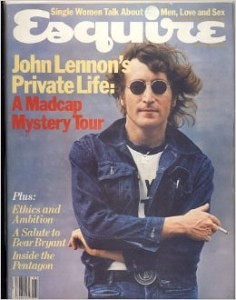
Inside: Laurence Shames’ “John Lennon, Where Are You?”
I am in the process of throwing out the contents of several filing cabinets, almost a decade’s worth of paper. It’s quite a daunting task. This morning I unearthed something cowering among the dust and silverfish that I thought might be of interest: “John Lennon, Where Are You?” by Laurence Shames. Published in the November 1980 issue of Esquire, Shames’ unsuccessful attempt to meet and interview the ex-Beatle is a fascinating portrait of Lennon taken from an oblique angle.
It’s nowhere online, so I’ve uploaded the PDF below, to make the information accessible to fans, scholars, and any other interested parties. It was definitely helpful during the writing of my comic noir novel, “Life After Death for Beginners,” which some of you have read and enjoyed. Of late we’ve talked about this site carrying the banner for smart, historically aware Beatle fandom, so I thought this might be something Dullblog could begin to do, saving items from the memory hole.
In addition to Shames’ article I’ve included the letters section of a subsequent issue; I found the reactions interesting. It was run in January 1981 — but created in November 1980 if not earlier, well before Lennon’s death. The media was full of stuff like that, items out of sync with the new reality; and for a bit of time one saw content created before December 8th that was fairly caustic, suddenly seeming vastly inappropriate.
John Lennon, Where Are You? by Laurence Shames, originally published in Esquire, November 1980.
If this proves popular, I’ll add more extracts and articles to the site. On the back of the scanned pages I’ve written in blue ink, “I preferred a puzzle to a self. — John Lennon, December 1970, Esquire.” This is from an earlier article which I will scan and post if people like this one. It’s got a frankly racist title, but it’s a revealing glimpse of John and Yoko in the days of Primal Scream.

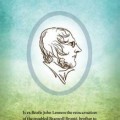

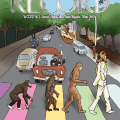

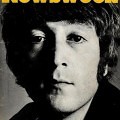


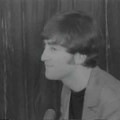

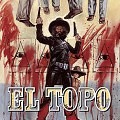


Yes! Thank you, Michael! I have looked everywhere for this article and never found much. Thank you so much for uploading and future thanks for you (hopefully!) uploading more great stuff in the future.
What unbelievably tragic consequences this article would have. I wonder how Mr. Shames reacted to and continued to feel knowing his piece of journalism re John was the (if you buy the official story) impetus that started the downward spiral of that maniac who murdered john.
You’re welcome, @Craig. If we do upload more stuff, I think it will be a boon. I was amazed it hadn’t made it online. (Esquire itself is doing more and more mining of its archives — go to EsquireClassics.com for more details.)
Chapman also mentioned Anthony Fawcett’s “John Lennon: One Day at a Time” as something he’d read, and IIRC that’s a standard hagiography. So I highly doubt Shames’ tone had anything to do with anything. What is beyond question however is the need some fans had/have for Lennon to be something very specific, and their anger towards him when he had the audacity to be a normal, changeable, flawed and searching human being. Hagiography is just one side of a fundamentally unfair coin.
Wow, that’s some purple prose in the sub-Chandler vein, with a side of smirk! I groaned when Shames referred to a woman he was interviewing as “the frail.”
Someone (OTHER than Goldman) needs to write a book about 1980-81 and the beatification of Lennon after his murder. That would be some fascinating cultural history, if someone with solid knowledge of historical methods and a degree of objectivity wrote it.
I can’t blame Lennon for wanting to hide, given the kind of obsessiveness this article demonstrates. That Shames keeps calling Lennon “The Walrus” speaks volumes. “You may have said you were the Walrus and now you’re just John, but we will never let you stop being the Walrus!”
Thanks for posting this Michael–what a gem.
Striking to me (but not surprising) is the account by Buck who said that John was depressed. So many others have made this observation, although John always insisted that that period was the happiest of his life. It really is sad, how utterly miserable John was while trying to project this idea his life was perfect.
Thank you so much for sharing this. Absolutely fascinating to see how Lennon was perceived just weeks ahead of Double Fantasy. These days, a huge star taking 5 years between albums doesn’t seem surprising, and nor is the idea that they would invest their money. What struck me is the notion that John and Yoko were recluses, when in hindsight it seems it was their visibility that led to John’s death. Perhaps they weren’t recluse enough.
If anyone tries to tell you that new technology has killed off proper journalistic reporting, just show them this article. Shames was paid good money for this glorified blog post (plus expenses for his trips to Miami etc). Esquire published it as a cover story. Advertisers paid for the privilege of being on the opposite page. And the poor old reader had to put up with it, because there was no alternative. Thank God for the internet!
@Dan, I beg to differ, there was an alternative: John and Yoko’s interviews in Playboy, Newsweek, and Rolling Stone. If you read those, and Shames’ article, you’d get a very thorough view of John and Yoko, circa 1980. And it would be much more efficient — are you really going to read fifty blog posts? What if you miss the best one? Our Devin’s great, but he can’t replace an entire floor-full of full-time, decently paid professional writers and editors. Everything you like about this website would be better, if we were getting paid to do it.
If Double Fantasy were coming out today, the publicity would all be generated by John and Yoko themselves — perhaps co-signed by MTV/VH1, or Amazon. Because all parties would want maximum sales, there would be no adversarial push-back. Sure, you wouldn’t get Shames’ cheekiness (or you’d get it in a million unread posts and tweets), but you wouldn’t get anything worth posting 35 years later.
The internet has been an extinction-level event for everybody in the publishing business; while promising diversity and egalitarianism, it has given us exactly the opposite. Because it’s impossible to make a living creating content, the professional writing class is now even MORE upper-class and white. Editing, especially the taste-driven kind you’re wanting here, is a lost art. Publishing is more beholden to corporate adbuyers than ever (“native advertising“). Because there are no institutions strong enough to pay for journalism — for those tickets to Miami — less and less adversarial journalism exists. Don’t get me wrong, it was no Golden Age; but simply from the standpoint of quality of information, diversity of viewpoint, efficiency of consumption, and the national intellectual culture it created, pre-internet journalism was unquestionably better. Anybody who tells you different is wishing; and if you question them hard enough, they usually end up saying, “Well, we can’t do anything about it, so…”
In 1980, Donald Trump would not have been a serious candidate for President; people like him existed, but powerful gatekeepers dismissed them. It’s nice to say that things are better and freer and more democratic now, but in 1980, the fringe candidate was John Anderson, not Donald Trump. In 1980, we didn’t rely on comedians like Jon Stewart to do the job of journalists, because we could still pay journalists.
Because I’m an optimist, I believe things will eventually settle down and we’ll have a blend of old-fashioned institutional curation, backed with digital efficiencies in production and distribution. Shames’ article is a time-honored solution to a typical magazine problem: the subject won’t give us an interview. Was it successful? All I can say is, I’m glad we have it to post, 35 years later, and the traffic so far suggests that the readers agree!
Have to agree to disagree on this. I’m an ex-journalist and publisher, and I know first hand how the internet has destroyed traditional publishing. It’s been terrible for our profession, but ultimately a godsend for the public. We were just a middle man who has been cut out.
Wishing for the days of ‘gatekeepers’ telling the public how to think is like the Church complaining about the printing press, or EMI complaining about Apple. The spirit of the Beatles was against the whole concept of gatekeepers.
If 1980 was 2015, we could log on to the county courthouse records to see what Lennon owns, check David Peel’s twitter feed/website to see his thoughts on Lennon, use google streetview if we want to have a look at his house in Florida, and discuss our feelings about John’s ‘retirement’ on one of the many Beatles forums. And I’m pretty sure some of the fans’ insights would be more interesting than what Shames had to say.
I agree that the well-written magazine feature is a dying art, but so what? Many people missed the sound of horses’ hooves after the rise of the automobile, but they didn’t go back to the horse and cart.
Aw @Dan, come on now — we’ve been listening to this kind of utopian talk for what, 15 years? Yes, that’s how things could work, but it’s not how they do work. When will internet triumphalists admit that we’re getting less choice, not more? When Facebook is publishing everything? Talk about gatekeepers, Christ!
It’s pretty clear that most people aren’t interested in being the kind of active consumers/collators/investigators of information that you’re suggesting here. For a million different reasons (time? money?), most people seem to prefer a passive relationship. Suddenly saying, “OK! Now you’re ALL journalists!” hasn’t really generated a lot of top-quality journalism. The people who celebrate it are invariably people with really strong information skills/aptitudes/backgrounds, such as yourself; but it’s gotta be said that while the internet has produced Wikileaks, we’re still waiting for a citizen-sourced Watergate. Meanwhile, my friend is doing investigative journalism for First Look, which is the brainchild of a billionaire — a publishing model that’s been around since Gutenberg.
Most readers of magazines and newspapers want to be readers, not writers or editors, and giving people like you and me the ability to run blogs isn’t worth the death of an entire industry. Believe me, if I felt blog-driven literary culture was as good as the institutional-driven kind, I’d be overjoyed. Nobody’s suffered more at the hands of editors and publishing elites than I have. But it’s wildly inefficient, and makes each person wear every hat; if I had back all the hours I’ve had to spend learning new software programs, or marketing, or SEO… And it’s nearly impossible to gather an audience of any meaningful size. And it’s never solved the basic problem of how to make money, which is foundational in a capitalist society.
Yes, and I could also buy all the components I need for this computer and spend 100 hours putting it together, thereby saving some money and getting some extra features…or I could buy a Mac, because I have neither the time, the technical training, nor the interest in making my own computer. Why is information any different? A magazine — or indeed a website — is a tool, and demanding that each user custom-make their own tools is… well, it’s peculiar. We don’t do it anywhere else. Why in information?
Here’s my guess why: writing/editing/copyediting/etc — what I’ll call “information skills” — have been systematically devalued by industries with an economic need for cheap information supply. And that industry has spent untold amounts of money spreading the idea that information wants to be free, everybody can be a publisher, and so forth. Which is fine, except that the devastation of the publishing business hasn’t been counterbalanced by equivalent benefits. So your Aunt Minnie can finally self-publish that mystery — good for Aunt Minnie. But better for the company that makes the software used to make that book; and best of all for Amazon who sells it. However, it’s not really good for the world, because Aunt Minnie’s book isn’t very good, and the time that anybody spends reading it is time they’re not spending on something else (suddenly this comment seems very useless). And I hasten to add: I made my biggest mark self-publishing. I know what it can do, and I know that being able to circumvent legacy book publishers frightened by Warner Bros was key to my professional success. But I’d spent 20 years being trained traditionally before I went that route. And even so, my book would’ve been better — significantly better — if it had been created within a gatekeeper structure, with the support structures that used to exist inside them. And I also know that the money I made — the money that bought me the time to create and maintain this blog, and pour endless unpaid time into it — was generated via a conventional publishing model. If I brought out Barry Trotter today, it would’ve been even more pirated than it was, and I would’ve made one-tenth the money, and this blog wouldn’t exist.
In a world of more and more information, where spin and PR are ever-more omnipresent, information skills are more important, not less. The internet has given us lots of good things, but it’s also given us Donald Trump as a viable Presidential candidate — that is a direct result of infantile, siloed, falsely equivalent intellectual culture created by the internet. The demise of the gatekeepers hasn’t been filled by proactive citizen users, but by the mechanisms of PR — as I said in my earlier comment, if “Double Fantasy” came out today, there would be no dissenting view. It would only be the content created by John and Yoko, and relentlessly promoted by Amazon.
And I think it’s important to ask: are you defending the state of things today because you truly think it’s good? Or because you can’t see an alternative? Sure, Shames’ article was cheesy — but Esquire produced culture that people still use to define that era; Herman’s Hermits was cheesy, too; but I’m glad we had the structure that allowed them, because it also gave us the Beatles.
Very little is pre-ordained. Sure, the automobile was an improvement over the horse and cart, but the gas-powered car wasn’t necessarily wiser than the electric one. What I want is a world where the internet can do what the internet does well — distribute — that also has a space for a truly for-profit information culture. Otherwise, we’ll get trash. Creative art is the only area of modern life where the dictates of capitalism are considered to be immaterial; if tomorrow the decree came down that all candy was free, yes some people would make their own candy, and occasionally you’d run into a piece that was better than the mass-produced commercial kind. But by and large, people would eat less candy, eat a lot more bad candy, and that bad candy would eventually break people of the habit. That’s what is happening with literary culture, and art in general. This is a terrible tragedy. The internet doesn’t make readers into trained writers or editors any more than Mao could make Chinese peasants able to smelt iron. Celebrating homemade iron is fine until you have to build a bridge.
The spirit of the Beatles only existed because there were gatekeepers, Dan — a functioning business model that allowed J/P/G/R to create art and be well paid for doing so. Gatekeepers don’t just restrict discourse; they also do things that you’re not good at, or don’t have time for. EMI didn’t tell the Beatles what to sing; but they did enable them to make money from singing. A world where every computer has the recording capacity of Studio Two has not produced any more Beatles. You may disagree with me, but you can’t disagree with that.
There’s an article, “Gig Business,” in last Sunday’s NYT magazine about the digital revolution and creative work. The author, Steven Johnson, argues that it’s brought mostly positive changes. He leans hard on the “we don’t need middlemen” argument, and only at the end of the article acknowledges some drawbacks to the changes digital culture has brought to music, in particular. This is as close as he gets:
“These new careers — collaborating on an indie-movie soundtrack with a musician across the Atlantic, uploading a music video to YouTube that you shot yourself on a smartphone — require a kind of entrepreneurial energy that some creators may lack. The new environment may well select for artists who are particularly adept at inventing new career paths rather than single-mindedly focusing on their craft.”
That seems to me to be putting it mildly. Without gatekeepers who “do things that you’re not good at, or don’t have time for,” each creative artist is left to make his or her own way virtually unaided.
Johnson says that “Write a novel or record an album, and you can get it online and available for purchase right away, without persuading an editor or an A&R executive that your work is commercially viable.” But what he leaves out is that the result is an enormous number of such self-produced works that go virtually unnoticed, because there’s no entity behind them promoting them and the artist lacks the time, money, reach, or know-how to promote it effectively. And many of those works are mediocre at best, which makes sorting through them to find the good stuff extremely time-consuming for the would-be purchaser.
OK, I was coming on here to delete my earlier comment, because it was just too dog-in-the-manger, even for me. But then you commented on it @Nancy, so now it has to stay.
The real story is in the Comments section of that NYT article:
“Who is making all the money on kickstarter? Mainly musicians like Amanda Palmer who had a record deal and already have a following. Who is making money touring? Mainly musicians who were once signed and are now floating on the fan base that was created with their labels.”
That’s been my experience, too. The people who made their mark before the Internet hit are fine — they use the internet to build and strengthen their brand that was created by institutions.
There’s a whole generation of creatives who think buying lottery tickets is the same as winning the lottery. The “Gig Business” works OK — until you hit 40, or want kids, or get sick, or want any kind of financial security. And then what? Instability is the enemy of art.
A mentor of mine — the CEO of Reed/Elsevier at the time, one of those dreaded “gatekeepers” — told me, “A business is not just about making money. It’s about giving your employees the ability to create good, meaningful lives.” Note he did not say, “Give one person the ability to become a billionaire.” That’s really what the Gig Economy’s about, a kind of winner-take-all, hyper-competitive sickness rooted in ego. Hurray?
The creative life has always involved as much hustle and luck as talent. But now, because of oversupply, the inability to establish scarcity, and a profusion of tech-driven platforms fracturing audiences, the odds are a lot lot longer, and the rewards are (generally) smaller. For example: an article in the NYT magazine used to signal a certain level of professional stability — not a king’s ransom, but access to certain types of assignments for certain types of publications, that would, in the absence of egregious personal misbehavior, allow one to live in New York City, maybe have a couple kids, and so forth. Now, I suspect it means no such thing, and that’s not progress.
But here’s the TL;DR: The NYT mag hasn’t been made better by the increased competition and instability; whenever I see it, it’s pitifully small, and the editorial is generally zeitgeisty bullshit beloved by the ad side. Esquire’s even worse; you think Shames’ is bad? Let me introduce you to “Lake Bell Tells Us What It’s Like to Shoot a Threesome” — thank goodness we got rid of all those gatekeepers, right?
It is what it is, and my bitching about it isn’t going to change it. But it’s definitely not going to change if we swallow the tech-biz bullshit that this is natural and inevitable — a great thing for artists! It’s a totally arbitrary commercial evolution engineered by one powerful and lawyered up sector to benefit themselves, at the expense of a group of ununionized individuals.
If 1980 was 2015, we could log on to the county courthouse records to see what Lennon owns…
Here’s a horrible thought: if 1980 were 2015, Lennon’s murder would have been captured by several surveillance cameras at the Dakota entrance and lobby. We’d have several views to choose from on youtube, tmz, and a million other places online.
There’s something to be said for privacy.
If I remember correctly, This is the article that initially put Lennon in Chapman’s radar in 1980.
@P, as stated earlier in the thread, I think it was this article, and the book “John Lennon: One Day at a Time” by Anthony Fawcett. Does that gibe with your memory?
Here’s a link to a New York magazine article (June 22, 1981) that describes Chapman reading Shames’ Esquire piece:
https://books.google.com/books?id=BeYCAAAAMBAJ&pg=PA30&lpg=PA30&dq=mark+david+chapman+esquire+article&source=bl&ots=EaAg4LfUz8&sig=himiFKVIvM_bCCJ3IOkqvcAoPY8&hl=en&sa=X&ved=0CDsQ6AEwB2oVChMIibbrxtfAxwIVywaSCh1YFQp1#v=onepage&q=mark%20david%20chapman%20esquire%20article&f=false
So who, or what, the heck was Shames referring to re the old frail woman at the start of he article? Was he implying she was a junkie friend of John’s? Sorry, I’m too thick to pick up on what he was laying down…
I think he was using “frail” in it’s hardboiled film-noir sense, @Craig. Just means “female.”
But you raise an interesting point. John and Yoko’s five-year cocoon had a great big hole in it, which was their continuing drug habits. From 1975-80, while they were out of the “public eye,” but not only could they be seen around the neighborhood — which is awesome, who doesn’t love the idea of that? — they had to rub shoulders with all sorts of characters, some doubtless pretty dire. Heroin is NOT pot, and you were dealing with a totally different set of characters if you were scoring the one or the other. (Hell, you could even grow your own pot, and most hippies I remember did.)
That’s an aspect of Lennon’s stardom that’s never been sufficiently accounted for; Goldman tried, but it came off as lurid, which it was. But that’s part of why people will be writing and thinking about John Lennon for centuries. What makes Lennon such a fascinating character is how he could both write “Woman is the Nigger of the World,” and frequent Korean whorehouses on 23rd Street. Both parts are necessary for a full portrait, but the former is public (thus fully known) while the latter is not only private, but illegal — so there’s a distortion from life that most fans ignore.
But all this can’t be forgotten, if you’re thinking about Lennon in the solo years. It’s simply a huge difference between John’s life and Paul’s, and from the life comes the work. There’s a built-in grubby hard-drugs factor to John’s life that nobody really acknowledges. And the drugs were just the occasion for grubbiness; what kept it going was John’s romanticism. If you looked or talked “street,” John’s romanticism would overwhelm his paranoia. Sometimes this was a good thing (innumerable man-on-the-street interactions), but sometimes it really wasn’t (Allen Klein, Michael X, Jerry Rubin/Abbie Hoffman).
Shames is still in the game; still writing books and a blog. Of course lucrative magazine assignments aren’t as plentiful as they were in 1980.
One thing I’m curious about: Has he ever addressed the subject of YouKnowWho reading his article and the other crap book (I bought the crap book when it came out in the ’70s, read it once, and then stuck it on a shelf because it’s…. crap) and then getting the idea to travel to NYC to kill his idol? I’ve looked online and haven’t found anything.
Does anyone have any links to Shames writing about the assassination?
There is no mention of Lennon here:
http://www.laurenceshames.com
It’s such an odd start to the piece, isn’t it? I mean, he’s in Kearny with some woman who is a huge fan of johns but was supposedly his “busom buddy” for the 1970s. She has one crusty photo of John sitting in a lawn chair in someone’s back yard… How the heck did Shames find her and what the hell was he trying to tell us by introducing us to her?
That’s exactly what I was getting at with my first comment (#1 on this page), Sam. How the hell did Shames react to the news that his piece of icky journalism quite possibly led a psychopath to murder John? React isn’t the right word, I mean, this is the kind of news that can really fu*k your life up, if you’re Shames in 1981. Thing is though, it’s not so widely known, this story of psychopath reading Shames story –> being angered by it –> killing john partly because of said story. If I was Shames I’d’ve worked hard to keep it that way.
If I was Shames I’d’ve worked hard to keep it that way.
.
Good point. Here’s a biographical fragment from the Shames website:
By 1979 he’d somehow become a journalist and was soon publishing in top-shelf magazines like Playboy, Outside, Saturday Review, and Vanity Fair. (This transition entailed some lucky breaks, but is not as vivid a tale as the fritto misto bit, so we’ll just sort of gloss over it.) In 1982, Shames was named Ethics columnist of Esquire, and also made a contributing editor to that magazine.
.
Interesting that he tries to suggest (in a very subtle, roundabout way) that he didn’t appear in Esquire until two years after Lennon’s death. He doesn’t mention Esquire in his 1979 freelance credits.
.
Also, it seems from his blog
http://www.laurenceshames.com/blog/
that he is now an “indie” author. He was edited and published by all the majors in his long career, but he is currently self-publishing on amazon. He describes the publishing industry as being “less civil” today, which I suppose is a good way of putting it.
Re. One Day at a Time: Apparently, the thing that (further) maddened Chapman had nothing to do with the text, but rather the photos of John on the roof of the Dakota – grist to the mill of this “hypocrite” stuff. If you ask me, the roots of John’s murder can be traced back to the ridiculous furore stirred up in the US in 1966 about John’s self-evidently true (at that time) comments regarding the influence of Christianity on the youth of the day in Britain. While Chapman was clearly the only person to blame for John’s brutal killing, there are others who should, nevertheless, have felt ashamed.
Sean, I think you’re exactly right. Lennon’s comments stirred up a fundamentalist ire that simply never went away after that. Remember, too, that Chapman underwent an earlier period of antipathy towards Lennon, as the result of MDC’s conversion to fundamentalist Christianity (I believe it was around the time of “Imagine”). But Lennon wasn’t wearing the cross hypocritically in those Gruen photos — they were taken during his own brief dabbling in Christian fundamentalism.
In the mania years, the Beatles’ obvious subversions of the norm were counterbalanced by a carefully maintained image of their harmlessness. This was one of Epstein’s most important brainstorms, and biggest ongoing challenges. The “lovable moptops” image that many came to disdain was a Trojan Horse for the very real changes in mores that the Beatles were accelerating. Lennon’s comments in ’66 weren’t that shocking to anyone who’d been paying attention — in April 1966, TIME magazine ran its famous “Is God Dead?” cover story. But what added so much fuel to the fire was the sense in some quarters of “Aha! I always told you they were bad guys!”
The explicit hypocrisy was preaching one-ness but participating in capitalism — but I don’t think that really bothered people. I think what really bothered the nutcakes was the sense of hidden hypocrisy — hidden danger. That’s what your David Noebel’s and ilk really groove on. “They seem harmless, but really they’re corrupting your CHILDREN!”
Nothing Lennon ever did or said was anywhere near as corrupt, two-faced, self-serving or dangerous as the activities of any Fortune 500 company. Yet the fundamentalists never squawk about that. It’s peculiar indeed.
I think John Lennon loved America, but I don’t think he ever really understood it. Or, I think he tried to ignore the darker sides of it.
John Lennon wasn’t Chapman’s only target. People who try to invest Chapman’s motives as based purely on Lennon or John’s politics or John’s “hypocrisy” are ignoring the fact that Chapman had quite a list of potential celebrity targets. That list even included McCartney at one point but Chapman has said he thought Paul was too difficult to get to in England. John, unfortunately, wasn’t that difficult to get to. So I doubt that Shames’ article or any one article led Chapman to pick his target. A lot of things led up to Chapman’s ill-fated crazy decision.
—
Chapman was celebrity obsessed and looking to be famous himself. There was no real rational explanation or rational motivation behind his actions. The guy was/is nuts.
@Drew: Couldn’t agree more that there is no point in attempting to apply logic to his motives, but there is, surely, some point in trying to “understand” them, however objectionable they may be.
@Michael: I think John loved NYC, which is not the same thing as loving the USA. He certainly didn’t love L.A., for example. “Lost Arseholes” was the phrase he used. How much time did he spend anywhere else?
Agreed, @Ken. I was going to write a sentence about how NYC really *isn’t* the USA — to the relief of both sides — and this was never more so than in the Seventies. And it is no surprise that he hated LA in the 70s; he didn’t drive well, for one thing, and it’s an industry town run by an industry that he was itching to get away from (or only participate in on his own terms).
But I think he might have a different opinion of both places today. A lot of what Lennon loved about New York is gone, and LA’s gotten weightier in the last 40 years. What’s your sense?
I liked your “to the relief of both sides” comment. Too true! My comment was a little (or a lot) unfair to LA. “Lost Arseholes” certainly had more to do with John and the company he was keeping at the time than with Los Angeles per se.
It’s hard for us Brits to talk about the US. For one thing,compared to the UK it is huge (though the UK is astonishingly dense socially and culturally – as the old cliche has it, go 50 miles in any direction and etc.), and there is nowhere else in the world that could have produced a city like NYC (or LA, for that matter).
I’m not sure how much the gentrification of the Lower East Side would have affected John though, holed up on the Upper West Side as he was.
It’s the huge sadness of all this that we have no idea what John would think these days, or be up to these days. I bet our guess would be wrong about it, though.
John sought out “Lost Arseholes,” so that’s what he found. If you believe the conventional story, he WAS a lost arsehole, which is what I suspect he really meant. LA in the 70s must’ve been quite a strange place. Heat-stricken. Overripe.
One of the things that I find fascinating about where I live (Santa Monica) is how it was a magnet for UK expats; when Lennon was hanging out on the beach with Keith Moon and Harry Nilsson, Hockney was here, Isherwood was here — so it mustn’t have been a total wasteland. Even by the time we moved here ten years ago, there was still an English tea room downtown, and two shops selling imported stuff from the UK/Ireland. Can’t recall if Santa Monica is a setting in “The Loved One,” but it might has well have been.
I love the UK. I woke up yesterday thinking, “Thank goodness for the UK.” If you’re an American creative person of my vintage, chances are good you sought out UK culture as a kid; just as the Beatles all glommed onto American culture in the 40s and 50s.
What’s happened to NYC is simply vast — here’s a little article about it. People say Manhattan’s a shell of what it once was, with everybody out in the boroughs because the rents are insane, and vast swaths of once-hip neighborhoods are now full of chain stores. One must remember that New York City in the 70s was an exceedingly dire place, and the UWS was, during the time John lived there, less than a generation way from “West Side Story.”
Personally, I first visited NYC in ’76, and then several times in the 80s. From 1987 on I lived in Connecticut, commuting regularly for magazine stuff, and moved down in ’91. Even the changes from, say, ’87 to 2001 when I left were simply immense. Some of the changes were very good — it’s good that Washington Square Park and Tompkins Square Park became safe. It’s good that street crime dropped. But I think John’s particular relationship with NYC was not unlike that of a Roman patrician — he liked the squalor, because it was entertaining and reminded him that he wasn’t in it! He could be a tourist in it. Who knows what he would’ve said about it publicly (he was a dad, after all), but privately, I think New York after Giuliani — and AIDS — probably would’ve bored him to tears.
Interview with the author of the Esquire piece:
http://www.esquire.com/entertainment/music/news/a40292/john-lennon-esquire-profile-qa/
Care to give us a synopsis, @Sam?
He feels bad; it was meant to be a fun, light-hearted article. He knew someone socially who invited him to write for Esquire (see kids, it’s true: you really DO have to know people!); it was only his second published piece.
He really didn’t expect John to want to sit down with him for an interview (although he says it would have been nice). He says he got weird calls and death threats. He’s more comfortable now writing novels.
He learned that you have to be careful about what you put out there because you never know how crazy people will interpret what you say.
That’s the interview, in its essence.
Here is a link to the original article, is easier to read vs. the PDF: https://classic.esquire.com/john-lennon-where-are-you/
Interesting to read this piece again (and the interview with Shames about the piece). I’d read it when it first came out and didn’t look at it again after Lennon’s murder. The only specific thing I remembered was the isolation tank, which I thought was cool and interesting — possibly another way of exploring the self instead of Shames’ view that it was yet another way he was trying to run away from everything.
Reading this now, I’m struck by how there’s nothing to it except some low-level snark and disappointment. Lots of generalities and nothing that really stands out (either about Lennon or Shames). I was a kid and definitely unsophisticated at the time, but I loved John Lennon even if I didn’t always love all his music. If I’d been older, I might have thought the article was a whole lot of nothing when I read it. It’s impossible to view this article (or Double Fantasy, for that matter) in the same context as we might have before Lennon was shot.
38 years later (and several years after you wrote this post), I still feel that profound sense of loss of someone whose essential spark was monumental and special and something we needed then and need more than ever now. The music was just part of the way that spark was expressed (and he had his share of misfires after the Beatles broke up), but great things were in store for him. It would have been wonderful to see how he’d evolve as both an artist and a person.